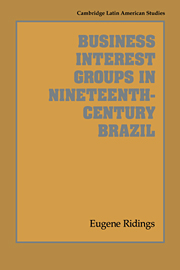Book contents
- Frontmatter
- Contents
- Acknowledgments
- Abbreviations and Usage
- Value of the Mil-reis against the Dollar and the Pound
- Brazil, with cities
- Introduction
- 1 The Genesis of Brazilian Business Interest Groups
- 2 Leadership and Organization
- 3 Influence, Ideology, and Public Relations
- 4 The Export Economy: Agricultural Quality, Markets, and Profits
- 5 The Export Economy: Banking, Credit, and Currency
- 6 The Export Economy: Manpower
- 7 Taxation
- 8 Industrialization
- 9 Communications: Regionalism Perpetuated
- 10 Port Areas and Harbors: Efficiency and Rivalry
- 11 Business Interest Groups and Economic and Urban Integration
- 12 Business interest groups and the Republic
- 13 Conclusion
- Bibliography
- Index
Introduction
Published online by Cambridge University Press: 27 October 2009
- Frontmatter
- Contents
- Acknowledgments
- Abbreviations and Usage
- Value of the Mil-reis against the Dollar and the Pound
- Brazil, with cities
- Introduction
- 1 The Genesis of Brazilian Business Interest Groups
- 2 Leadership and Organization
- 3 Influence, Ideology, and Public Relations
- 4 The Export Economy: Agricultural Quality, Markets, and Profits
- 5 The Export Economy: Banking, Credit, and Currency
- 6 The Export Economy: Manpower
- 7 Taxation
- 8 Industrialization
- 9 Communications: Regionalism Perpetuated
- 10 Port Areas and Harbors: Efficiency and Rivalry
- 11 Business Interest Groups and Economic and Urban Integration
- 12 Business interest groups and the Republic
- 13 Conclusion
- Bibliography
- Index
Summary
The idea of writing a history of Brazilian business interest groups came by accident. Many years ago I arrived in Salvador to undertake research, only to find that my topic had been taken. Desperate to find another, and aware that the Commercial Association of Bahia had played a role in regional politics, I obtained permission to leaf through its archival records. The dusty nineteenth-century annual reports (relatórios), minutes (atas) of its meetings, and other records stored in the attic of its historic headquarters were something of a revelation. They indicated that the Bahian association, and by inference other commercial associations, had rather quietly exercised great influence on all levels of government. The commercial associations today remain among the most powerful of organized interest groups (also called pressure groups) in Brazil, but their impact obviously had been much stronger in the nineteenth century, when other organized interest groups were few, great corporations had yet to appear in any number, and countervailing, or contrary, influences were rare. As Philippe Schmitter has noted, “Until well into the twentieth century these commercial associations served as the sole aggregators of the interest of the conservative classes,” that is, merchants, industrialists, and planters. Wider research showed that the influence of the commercial associations was sometimes enhanced and sometimes contradicted by two other types of potent, although usually less enduring, business interest organizations: the factor and industrial groups.
There is no book-length treatment of Brazilian business interest groups in the nineteenth century, although numerous histories of individual commercial associations have been written by members or employees of those organizations.
- Type
- Chapter
- Information
- Publisher: Cambridge University PressPrint publication year: 1994



